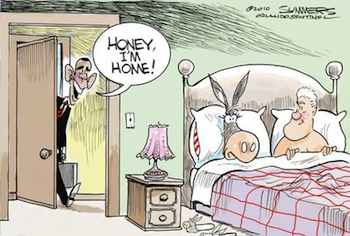- MENU
- HOME
- SEARCH
- WORLD
- MAIN
- AFRICA
- ASIA
- BALKANS
- EUROPE
- LATIN AMERICA
- MIDDLE EAST
- United Kingdom
- United States
- Argentina
- Australia
- Austria
- Benelux
- Brazil
- Canada
- China
- France
- Germany
- Greece
- Hungary
- India
- Indonesia
- Ireland
- Israel
- Italy
- Japan
- Korea
- Mexico
- New Zealand
- Pakistan
- Philippines
- Poland
- Russia
- South Africa
- Spain
- Taiwan
- Turkey
- USA
- BUSINESS
- WEALTH
- STOCKS
- TECH
- HEALTH
- LIFESTYLE
- ENTERTAINMENT
- SPORTS
- RSS
- iHaveNet.com: Politics
by Clarence Page

Obama - Clinton Tag Team
When President Barack Obama turned over his news conference to President Clinton like a tag-team wrestler and left the room to attend a Christmas party -- leaving Clinton to take questions from reporters about Obama's tax-cut deal -- he gave the astonished chattering classes plenty to chatter about:
"Obama's Stunt-Double Presidency," read an Investor's
"A Third Clinton Term?" asked a
"Clinton Refuses to Leave White House!" joked the disturbingly believable humorist Andy Borowitz.
Yet it soon became apparent that Obama was getting the last laugh. His Friday afternoon surprise with the former president gave visual support to a message conveyed by his pending tax-cut compromise with Republican congressional leaders: This president is triangulating, trying to regain independent swing voters in much the same way that Clinton did after his own midterm setback in 1994.
And who better to deliver that message than Clinton, the great triangulator himself?
At a time when Obama was getting roundly beat up by many of his own supporters for, at best, giving in too soon on his signature issue of limiting tax cuts only to those who make less than
Winning the center with this deal appeared to be easier than holding onto his base. An
On the other side, most Republican leaders and conservative pundits reacted initially with celebration after winning their core issue of "tax cuts for everyone," including the rich. A notable exception was conservative columnist Charles Krauthammer. He lamented that Obama clearly won the negotiation, even though "House Democrats don't have a clue that he did," by negotiating what amounted to a historic economic stimulus package of about
Clinton went on, as eager as any other retired person to share his wisdom, for almost a half-hour of answering questions. Obama slipped out of the room after the first 10 minutes, confident that Elvis still would be in the building, staying on message.
The sight of a president calling on a former president to help deliver his message was largely unprecedented, but watching the two share the stage, it was easy to see what Obama can learn from Clinton. For all of Obama's formidable oratorical skills, one is hard pressed to find any living American politician who beats Bill Clinton in the retail skills of political persuasion.
It would be hard to imagine, for example, Clinton casting barbs in public at his own liberal critics as "sanctimonious" and "purists" as Obama did in earlier defenses of his tax deal.
Clinton also learned from experience in his own unsuccessful attempts to pass universal health care that you don't get so wrapped up in policy that you forget the politics of reaching out to the country and thoroughly explaining the policy you're trying to implement, a failing to which Obama confessed in a
As Obama faces a new
Obama's big challenge will be to succeed where he has said in the past that Clinton failed. Triangulation forced Clinton, who came into office pursuing big ideas like health care reform, to begin thinking smaller -- like promoting mandatory school uniforms -- in order to compromise with his opponents. As Obama tries to pick up where Clinton left off, he has a lot to learn from the old master's mistakes as well as his victories.
Available at Amazon.com:
Courage Grows Strong at the Wound
Jimmy Carter: The American Presidents Series: The 39th President, 1977-81
The Disappearing Center: Engaged Citizens, Polarization, and American Democracy
The Virtues of Mendacity: On Lying in Politics
Bush on the Home Front: Domestic Policy Triumphs and Setbacks
The Political Fix: Changing the Game of American Democracy, from the Grassroots to the White House
Revival: The Struggle for Survival Inside the Obama White House
Renegade: The Making of a President
Year of Meteors: Stephen Douglas, Abraham Lincoln, and the Election that Brought on the Civil War
AMERICAN POLITICS
WORLD | AFRICA | ASIA | EUROPE | LATIN AMERICA | MIDDLE EAST | UNITED STATES | ECONOMICS | EDUCATION | ENVIRONMENT | FOREIGN POLICY | POLITICS
Receive our political analysis by email by subscribing here
Obama-Clinton's Tag Team Show | Politics
© Tribune Media Services